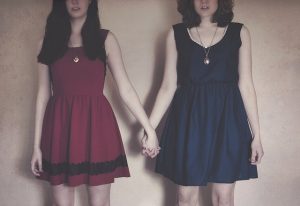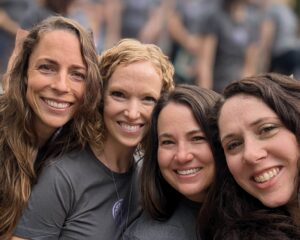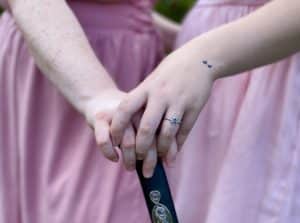Once upon a time (16 years ago) I came out. I was 18, in my freshman year of a woman’s college, and I had my first real girlfriend. I had a boyfriend in high school because I was a Mormon girl and that’s what you do. Though even then, I was pushing the boundaries of what was acceptable and expected. He was a different religion and from a different ethnic background, both of which caused grief for our families.
But once I was safely on the opposite side of the country, I broke up with that boy and came out, first to my sister, and then to my father. I told him that my friend Rebecca* was my girlfriend in the same way Michael* had been my boyfriend (*names changed). He said okay and we hung up the phone. Then he told my mother, who called me right back. She was NOT okay. I don’t remember many of the words that were spoken, but I remember crying. I remember she didn’t say she loved me when I hung up the phone.
I’m glad I came out to my sister first. We had always been close. I called her right after my call with my mother, distressed and bawling at what mom hadn’t said. I remember I couldn’t breathe. I had an asthma attack.
I found out later that my mother, in her own distress, called each of my three sisters to tell them about this terrible thing I had done. I felt so betrayed; but then, so did she. I don’t want to pretend that coming out should be easy for everyone – that parents and loved ones should automatically get it and be loving and supportive.
Especially for Mormons, with our doctrines of eternal life, eternal families, and kingdoms of heaven, it’s a trauma. I declared that I was threatening our family for eternity – I won’t be in the celestial kingdom, I won’t be sealed and having eternal children of my own, and our family seal is in jeopardy, because (particularly since November) I am an apostate. Apostates don’t go to heaven.
The experience was traumatic. For everyone. I was accused of lying, and the rift in our family lasted for years. In many ways, I feel like we’re still in recovery.

I’ve never again been so openly, publically out as I was in my safe, woman’s college haven. Until last weekend. I attended The Exponent retreat, as I very much wanted to meet all of the amazing ladies that I’ve become Facebook- and email-friends with. I had tentatively come out to one of the organizers and offered to assist with an ally-ship discussion. The next thing I knew, I was going to be leading the discussion! I was intimidated and very nervous. But I know myself, and I knew I had to get the worst part over with – establishing my credibility to the attendees of the discussion (pardon the formal turn of phrase – I used to teach public speaking, and that’s what we called it); I had to explain why I am qualified to lead this discussion. So I announced boldly, to an assembly of 140 strangers, that I am a queer Mormon.
So much time has passed since my first coming out, and the world is so different than it was. This time, I received an ovation! Attendees sought me out to tell me how brave I was. One woman told me that I had inspired her to also come out to this group; though she had been involved for a number of years, she had remained closeted – but not anymore. Another brave sister came out to me in private, not yet ready to speak the words publically, but finally finding the courage to speak the words out loud!
My discussion session was amazing. We had a new Momma Dragon, and I congratulated her! We talked about “standards” for single straight people vs. queer people. We talked about how to symbolize your ally status, so that those who are in pain know where they can reach out. We talked about the pain of the shift in perception for parents; we acknowledged and created space for that grief. We talked about the love of Christ. We talked about how my people, my queer tribe, are not yet safe; we desperately need allies. And we also need space for our own voices to be heard.
It was so beautiful. Most beautiful of all was that I attended the retreat with my sister, who attended my discussion and wears a rainbow bracelet to church every Sunday and teaches her son that LOVE makes a family. My sister, who can’t wait to throw me a proper coming out party with a rainbow cake, who isn’t “protecting” her son from me. I’ve never told her this, but when he was born, I feared she would. I feared I would be kept from my family because of my orientation. Happily, so happily, my fears never realized.
 This is where I originally planned on concluding this post, but I feel the need to add a brief response to Elder Oak’s September 16 comments made in Maryland regarding LGBT people. There are actually a number of things I want to say about it, but for now I’d like to talk about labels. When I come out, I take on a label. Elder Oaks says that this is dangerous, but I vehemently disagree. We identify ourselves by labels every day, and we use labels to find others like ourselves. When I was growing up queer in Mormon culture, I felt utterly and completely alone. I had no idea that queer was a thing that I could be. And when I found a word to describe my experience, I found that I wasn’t alone.
This is where I originally planned on concluding this post, but I feel the need to add a brief response to Elder Oak’s September 16 comments made in Maryland regarding LGBT people. There are actually a number of things I want to say about it, but for now I’d like to talk about labels. When I come out, I take on a label. Elder Oaks says that this is dangerous, but I vehemently disagree. We identify ourselves by labels every day, and we use labels to find others like ourselves. When I was growing up queer in Mormon culture, I felt utterly and completely alone. I had no idea that queer was a thing that I could be. And when I found a word to describe my experience, I found that I wasn’t alone.
That is the power of these words – finally discovering that I’m not alone. I’m not the only one. Words have so much power. Power to love and include and heal. And they have power to hurt. Finding my word was finding my home. That’s not dangerous. That saved my life.






37 Responses
Happy to know you a little better, Kalliope. I appreciate how open you are in this post–my family is also still in recovery, years after my brother and sister came out, so that really rings true with me. I especially like your last two paragraphs (thank you for adding them!!!). We don’t have to be reduced to a word or a label–we can be amplified and saved by them.
Thanks Emily! Recovery takes time, as do the necessary shifts in perception. It’s painful on both sides to go through that growth and the time it takes.
Please excuse my ignorance (and I know many here have been doing that for months) but you say your label is queer.
Why that and not lesbian?
I started secondary school in 1977 as an eleven year old. Queer was what we called gay people back then, port I should say people we thought were homosexual. Gay wasn’t a word for it then. As gay became the accepted word especially for men, with lesbian for women queer was a word not to be used. So is there a difference? When does someone no what is the label to use?
Hi Andrew,
Thanks you for your question, and I’m happy to clarify. “Queer” has historically been a derogatory term, but (like many terms that have been used that way), it has been adopted for use by the people it was used against. Queer is (although not without issues) used as an umbrella term for LGBTQIA+ individuals.
I don’t idenitfy as Lesbian because that doesn’t accurately describe my experience. Sometimes I will call myself Lesbian or Gay for simplicity, because identifying very specifically can be uncomfortable. Queer brings up fewer questions, actually.
If I identify with my specific labels, more questions are brought up than answers – and often very personal questions. When you ask what I am, you ask what turns me on. For me, that’s not dinner conversation!
You can know what label is acceptable to an individual by listening to what they call themselves. I know many people are hesitant to use “queer,” because of its history as a derogatory term. But we’ve reclaimed it. Our community is using it to identify ourselves. Some individuals still may not favor the term, but for me and many of my queer acquaintance, it’s our preferred general term.
Thanks. It makes sense of course that what a person calls themselves should be the one we use. However, with black people they use the ‘N’ word for themselves but that doesn’t make it acceptable for use by others. So i wondered if queer was the same, evidently it isn’t.
Having said what the word queer conjured up in my youth days, specifically at school, let me tell you of a vivid Seminary lesson. Back in 1981/82 we were studying the New Testament.
Reading in 1 Peter 2:9 reads thus: “But ye are a chosen generation, a royal priesthood, an holy nation, a peculiar people; that ye should shew forth the praises of him who hath called you out of darkness into his marvellous light.”
We learned we are a peculiar people and, to help us understand, our teacher had us look up the word in the dictionary:- “1. strange; queer; odd:”
Well that didn’t go down too well I can tell you 🙂
Words are difficult because they never actually fully work. My Mother didn’t like it when Gay became the word used for homosexuals to replace Queer. Why? Because gay was a word she had used in her childhood for its happy, carefree, sense. She felt the word has been stolen.
We can only ever really label ourselves. The labels others choose will never fully fit because they immediately narrow the impression we have of someone to our own view of a word.
I understand your mother’s point of view – I remember my own mother felt the same, and had a similar reaction to the rainbow flag. My education is in linguistics, so I’m quite the Word Nerd. Words, Language – it changes and evolves continually, and these changes are usually driven by the young generations and resisted by the elder generations. I knew I was gaining in maturity when I vehemently resisted the terms “chilllax” and “bae.” 😉
Yes! I agree that there is danger in reducing ourselves to a single label – and sometimes that label is “Mormon”. There are many wonderful, interesting things about ourselves to know and share with others. I’m so glad to hear that “important part of my family” is a label you get to keep, and I admire your understanding and making space for your mother’s feeling of grief and betrayal.
Thanks for sharing, Kalliope 🙂 I look forward to hearing more about how you navigate these waters.
Thank you, Olea! I appreciate your comments and look forward to getting to know you better through your posts. 🙂
Love this and love you, Kalliope. This year’s retreat was one of the most profound and spiritual I’ve ever attended, and I have you–among many others!–to thank for that.
Thank you, Libby! I had a wonderful time at the retreat, and am grateful to have gotten the opportunity to connect with you! 🙂
Beautiful, beautiful, beautiful, Kalliope. I’m so glad that you’re getting a better reception now, and that you’ve claimed your identity and that you’ve been received with love.
I admit that I’m not familiar with Elder Oaks’ comments from the 16th – could somebody provide a summary or a link?
https://www.lds.org/prophets-and-apostles/unto-all-the-world/elections-hope-and-freedom?lang=eng&_r=1&cid=HP_TU_13-9-2016_dPAAST_fCNWS_xLIDyC-2_
Hello Kalliope! I congratulate you for your courage. I dream of a day when nobody has to come out, because all are accepted. I am bi. I have a gay half-brother, and a gay granddaughter. God bless.
Thank you Diane! I also dream of that day. What a lovely, rainbow-filled family you have! I’m a bit jealous, as I’m the only purple sheep in my family… 🙂
I’m so happy for you, Kalliope! I know it’s not been an easy experience for you, and I know even leading the discussion was a big deal. Well done! (love those last 2 paragraphs, too — don’t Mormons label “priesthood” as primarily men? Ugh. So annoying!)
Thank you, Spunky! And thank you for bringing me into this amazing community!
Thank you for being in this community, being my friend, loving my daughters and being you. Xx
I had no idea this was another coming out, Kalliope! You handled it with grace and poise, and it was so wonderful to see all the love we retreaters had for you and the other queer participants.
I love this part most of all, “When I come out, I take on a label. Elder Oaks says that this is dangerous, but I vehemently disagree. We identify ourselves by labels every day, and we use labels to find others like ourselves. When I was growing up queer in Mormon culture, I felt utterly and completely alone. I had no idea that queer was a thing that I could be. And when I found a word to describe my experience, I found that I wasn’t alone.” Amen!
Alas, when you’re not cis-het, coming out is an almost constant ordeal! Thank you for your work on the retreat. It was amazing and I’m grateful I was able to participate.
I was so moved by your confidence and self-knowledge at the retreat, Kalliope. And I’m even more impressed by your honesty, openness and carefully considered articulation here. Thank you for being a part of our community and for letting us be a part of yours.
Thank you so much, Aimee, and thank you for warm welcome into the Exponent Tribe. I look forward to being in the community and raising my queer voice! 🙂
Thank you for coming out. Mormon feminists still have a ways to go with learning to be good allies to LGBTQIA people and I’m glad that you had a good experience at the retreat. <3
Thank you for thanking me! I had a great time at the retreat, and am looking forward to next year!
I’m so encouraged to hear that the second coming out went better than the first. Great post, Kalliope!
Thank you! 🙂
I can’t imagine the kind if bravery it has taken to have walked in your shoes, and to have had so much compassion for your mother’s experience. Thanks for sharing your story.
Thank you for reading my story, Melissa!
I wish I had been there for your presentation! “LOVE makes a family.” Yes. Beautifully and simply put.
I suspect the main reason Elder Oakes doesn’t like taking on labels is that naming things makes them real. And dealing with the reality of the spectrum of human sexuality is clearly something that he and his counterparts are not ready to do.
Thank you, Emily! I loved my discussion session, and was grateful for the opportunity. You’re spot-on that giving something a name means acknowledging it. Which makes the words all the more frustrating, given the position stated on mormonsandgays. The printed words and the spoken words are contradictory. 🙁
Love love love for you. Strength for you. I learned so much from you and that group.
Should have said strength FROM you.
Jeez, I’m trying to type quickly b/c I’m at work and it isn’t working.
Your words, I could feel, gave so much strength to that discussion and I think it is very brave for you to share your strength with others. I loved your last paragraphs here especially. <3 Speak on, sister.
Thank you for coming and being a part of the group!
Kalliope, thank you so much for what you shared, and how generously you teach all of us. “To love another person is to see the face of God” — Thank you for helping us know you, and love you, better.
Thank you for how generously you all are willing to hear and learn! This post has gone better than I’d hoped!
Thank you for sharing your experience. I love you, and am so glad that you could attend the retreat with me this year.